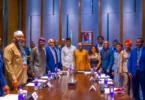TWO occurrences in the past week made me reach the conclusion that either the government is baiting the labour unions or there are quite active fifth columnists in the Tinubu administration.... CLICK TO READ THE FULL NEWS HERE▶▶
The first is the laughable ban of the trade unions from politics, including working within the Labour Party, LP, which was established in 2002, that is 21 years before the Tinubu administration came to power. The second is the rather baffling August 7, 2024 invasion of the Nigeria Labour Congress, NLC, headquarters by armed security men who came like thieves in the night. The invaders, like bandits, broke down doors and carted away property.
In a rather curious way, they made a bookshop on the premises one of their primary targets. Not even under the military were bookshops and books targets. Yes, the military was anti-intellectual and accused university lecturers of teaching what they were not paid to teach. But those fascists from the barracks did not take books as hostages.
When the NLC made public the invasion, there was silence from government. At a point, some started wondering whether the invaders were ghosts or Martians. It sounded so incredible that someone mused that the NLC, smarting from some attacks that it stayed out of the ‘EndBadGovernance’ protests, might have stage-managed the invasion.

Finally, the office of the Inspector General of Police owned up. Its rationalisation for the attack did not give much credit to any intelligence by the Nigeria Police Force, NPF. The NLC office is an imposing 12-storey building with the inscription: Labour House, which is visible many streets away. It is also a well-known building which the NPF has raided many times over the years, especially with Lawrence Alobi as then FCT Police Commissioner. So how can the police be selling the kindergarten tale that when it invaded the premises, it was not aware that they were the NLC offices. Police Spokesperson, Olumuyiwa Adejobi, in spinning this yarn, claimed that the premises raided “…turned out to be the NLC building.” He further claimed that the raid “was solely aimed at apprehending the prime suspect-a foreign national implicated in numerous criminal activities across Nigeria and other African countries.”
If this were so, why didn’t the police visit during work hours when the bookshop was open, and arrest the so-called suspect? Why wait until the night when he must have gone home before raiding the premises?
The police emphasized that its raid was not aimed at “the NLC, its Secretariat, staff or leadership”. If this were so, why did it raid the main NLC office on the 10th Floor where the offices of the Congress President, General Secretary and most principal officers are located, when the bookshop is on the second floor?
There is the more serious issue of the Minister of State for Labour and Employment, Nkiruka Onyejeocha, on behalf of the government, attempting to ban labour from politics. Minister Onyejeocha purports to rely on Section 15 (1) (2) (3) of the Trade Unions Act Cap T14 & T15 Laws of the Federation of Nigeria 2004 which bans trade unions from using union dues for political purposes.
She told the NLC and the TUC that the political objectives of this section include barring them directly or indirectly from incurring any cost or making any payment in holding political meetings, distributing literature or documents supporting any candidate or prospective candidate for election to any political office in Nigeria or any part of Nigeria.
This is all a joke because even President Bola Ahmed Tinubu and his campaign team in the 2023 presidential election, held meetings with both labour centres in which the trade unions and labour leaders incurred costs, including transporting themselves to such meetings. For instance, President Tinubu as the APC presidential candidate on December 19, 2022 at the Chida Hotel, Abuja, personally held a political meeting with leaders of the TUC and NLC.
He was accompanied to that meeting by his running mate, now Vice President Kashim Shettima; then Speaker of the House of Representatives, Femi Gbajabiamila, now the Chief of Staff; then Governor Atiku Bagudu of Kebbi State, now Minister of Budget and Economic Planning; then Governor Simon Lalong of Plateau State who became Labour Minister, and is today a Senator; then Governor Abubakar Badaru of Jigawa State, now Minister of Defence and Governor Abdulrahman Abdulrasaq of Kwara State.
At that meeting, President Tinubu promised that if elected, he would check mass unemployment, poverty, challenges in the education sector, the weak industrial base of the economy and evolve a credit system that would enable workers own their own houses.
Speaking directly to the NLC, TUC and their affiliate unions, Tinubu acknowledged their political rights and contributions to politics: “You have also been involved in the struggle for democracy and political rights. Your collective efforts breathe life into the democratic rights and economic ideals enshrined in our Constitution.”
The constitution he was referring to is the Nigerian Constitution which states in Section 40: “Every person shall be entitled to assemble freely and associate with other persons, and in particular he may form or belong to any political party, trade union or any other association for the protection of his interests.””
Minister Onyejeocha ought to know that the country’s Constitution she swore to uphold is superior to the labour law she is labouring to quote. She and those she represents must know that the Constitution of the Federal Republic of Nigeria supersedes, over rides and cancels any other law in the country that is inconsistent with it, and, that other law, to that extent, is null, void and of no effect.
In colonial times, the colonialists could not stop the trade unions from politics. In fact, the first national political party, the National Council of Nigeria and Cameroons, NCNC, was founded in 1944 primarily by the Trade Union Congress of Nigeria, TUCN; the Nigeria Union of Students, NUS; and the small Democratic Party led by Herbert Macaulay.
In the First Republic, labour leaders participated actively not just in partisan politics, but also elections. Some of them like Haroun Poopola Adebola and Samuel Udoh Bassey were elected into the Federal Parliament. In the Second Republic, labour leaders ran elections and some of them like Ayoola Adeleke and Joseph Ansa were elected Senators.
In fact, the first Labour Party was founded in 1950 by labour leaders led by Michael Imoudu. The second one was established in 1989, while the present is the third one. If the military could not ban trade unions from politics, what gives Minister Onyejeocha the impression that she can convert the Labour Ministry into a court and magisterially ban the NLC, TUC and their affiliates from politics?
What we are witnessing are poorly scripted Nollywood sketches.











